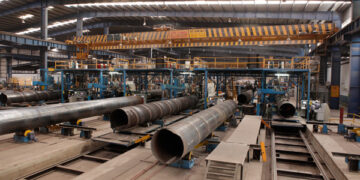PCBL LIMITED
Know the Company
PCBL Ltd (PCBL), formerly known as Philips Carbon Blacks Ltd, founded by Mr. K. P. Goenka in 1960, is currently a part of the RP-Sanjiv Goenka Group. PCBL has played a pioneering role in the Carbon Black industry in India, commencing production at its Durgapur facility with a capacity of 14,000 MTPA. Presently, with a production capacity of 77,000 MTPA, PCBL is the 7th largest producer of carbon black globally and holds the position of India’s largest producer and exporter.
PCBL offers a comprehensive portfolio of carbon blacks for Tyres, specialty, and performance chemicals, utilizing cutting-edge technology to meet the diverse needs of its global customers. Beyond the tyre industry, the Company’s portfolio encompasses carbon black grades tailored for industrial rubber goods manufacturers, enhancing the physical properties of their products. The Company’s product portfolio also extends to high-margin, non-rubber applications, especially with plastic holding the largest market share. PCBL’s specialty portfolio is strategically designed to cater to over 90% of the plastic market across different industries globally.
The company also excels in extensive expertise, spanning engineering plastics, fibers, and US FDA-compliant food contact grades. Additionally, its products find applications in cables, semiconductors, and several other high growth industries.
Manufacturing Facilities
PCBL has five manufacturing units located in strategic proximity to customer locations and ports, including each in Durgapur (Eastern India), Cochin (Southern India), Palej and Mundra (Western India) and Chennai (Southern India). The company also established an R&D center in Palej (Gujarat) and an Innovation center in Ghislenghien (Belgium).
Strength
Carbon black finds diverse applications across various industries due to its unique properties. It is a crucial component in the manufacturing of Tyres, where it enhances tread wear resistance and provides reinforcement to improve the overall durability of the Tyres. It is also using an addictive with plastic to enhance strength and resistance to environmental factors. In addition to this, it is also extensively used in electrical applications, particularly in batteries, electrical cables, printing inks etc. PCBL is actively working to enhance its capabilities in specialty carbon blacks which use applications in paint, coatings, and high-conductive applications such as conductive polymers, and batteries etc.
PCBL ranks as the largest manufacturer of carbon black in India with roughly 40% market share and the world’s 7th largest Carbon Black manufacturing company, serving a diverse customer base in over 50 countries worldwide. Almost 30% of the company’s revenue comes from exports market, which increased significantly over the last five years. The company also holds a robust presence in specialty chemicals.
The Company has been continuously increased its production capacity in accordance with market demands with special focus for the tyre industry. At the same time the Company expanded its product portfolio into performance and specialty chemicals which is a high growth-high margin area. The combined capacity of its existing five plants is 770 KTPA, along with a green power generation plant producing 122 MW.
PCBL has enhanced its competitiveness over the past six decades through diversifying its product portfolio and strengthening its global presence. The Company has a well-established international presence, with seven offices located in Europe, Asia, and North America. Its reputed list of clientele includes some of the most renowned global Tyre majors. In addition to this, the Company has also established as a key global player in the specialty black segment, securing its position as one of the top leaders in the industry.
Aggressive Capacity Expansions
In February 2021, PCBL commissioned two specialty black lines, totaling about 32,000 MTPA, at Palej, Gujarat. In the last fiscal year, PCBL successfully concluded the first phase of its Greenfield Project in Chennai, Tamil Nadu. Upon full completion, this project will enhance the company’s carbon black capacity to 147,000 MTPA. The second project is a brownfield initiative, which is under construction, located in Mundra, Gujarat. The plant is estimated to have a capacity of 40,000 MTPA and will be completed in two phases. Upon completion, the total manufacturing capacity is projected to reach 790,000 MTPA, accompanied by 122 MW of green power.
Strong Research, Development and Innovation
At PCBL, research and innovation play pivotal roles in driving technical and business growth. In recent years, the company has heightened its commitment to research through forward-looking investments in infrastructure, human resources, and processes. These investments have significantly fortified the company’s capabilities in new product development, product customization, product application, process efficiency, and more. PCBL has established global research and development facilities: the ‘Sushila Goenka Research and Development Centre’ in Palej, Gujarat, and the ‘Sushila Goenka Innovation Centre’ in Ghislenghien, Belgium, to drive innovation. The ‘Sushila Goenka Research and Development Centre’ in Palej is officially recognized by the ‘Department of Scientific and Industrial Research (DSIR),’ Government of India.
Financials
PCBL reported 11.7% quarter-on-quarter (QoQ) increase in its consolidated revenues for the quarter ended December (Q3FY24) to Rs 1657 crore from Rs 1487 crore (in Q2FY24). On a year-on-year (YoY) basis, it witnessed a growth of 21% from Rs 1363 crore. The net profit for the Q3FY24 grew by 20.5% YoY to Rs 148 crore from Rs 97 crore.
Strategic Acquisition
In November 2023, PCBL announced the acquisition of 100% share capital of Aquapharm Chemicals Pvt Ltd (ACPL) for Rs 3,800 crore. Established in 1977 and headquartered in Pune, India, ACPL is a leading specialty chemicals company engaged in water treatment chemicals, oil & gas chemicals and various other applications. ACPL is among the top three producers globally (excluding China, where it ranks second) of phosphonates. It is also India’s largest phosphonate producer and offers an extensive portfolio of over 275 products as well as over 250 strong customer bases. The company’s customer base including global leaders in FMCG, Oil and Gas, and Chemical industries, with a presence in 60 countries globally. ACPL operates manufacturing facilities in India, the USA, and Saudi Arabia.
PCBL currently derives over 60% of its revenue from carbon black for the tire industry. The acquisition of ACPL represents a strategic move for PCBL, as ACPL is a prominent global player in specialty chemicals, particularly in high-growth sectors such as water treatment, oil & gas chemicals and household, industrial, and institutional cleaning solutions. This acquisition positions PCBL to diversify its revenue streams, reducing dependency on the tire industry, going forward.
Importance of Specialty Carbons
Specialty carbons is a highly refined form of carbon black that contains lower levels of ash, sulfur, and metals, among other impurities to improve performance and durability. Carbon black serves as a crucial component in the production of specialty chemicals across various industries. Its unique properties, such as high surface area, electrical conductivity, and UV stability, make it a versatile and strong demand material for formulating high-performance chemical products. From enhancing the durability of automotive coatings to providing conductivity in electronic materials, carbon black plays a pivotal role in the development of specialty chemicals designed to meet specific industry requirements.
Indian Carbon Black Market
The Indian carbon black market is well positioned for substantial growth in the near future, primarily fueled by increasing demand from the tire industry. Rise in specialty applications also gives bright future for the company. The Indian carbon black industry is highly concentrated with a limited number of players accounting for the majority of the production. This industry is led by PCBL with the highest production capacity of around 40% in the domestic market.
Outlook
One of the primary drivers fueling for Carbon black industry’s growth is the increasing demand from the tyre industry, which accounts for almost 75% of carbon black consumption. Furthermore, carbon black plays a significant role in industrial rubber production, serving as both a filler and pigment. Its versatile application extends to various particle sizes and structures, making it a crucial component in the formulation of plastics, inks, paints, and coatings.
PCBL management projected that the Indian carbon black demand will grow at a growth rate of 5-6% in the coming years, driven by the robust expansion of the tyre industry and favorable macroeconomic factors. The promising outlook for the Indian automobile industry, buoyed by increasing demand and reduced imports for tyres, is expected to have a positive impact on the carbon black sector too. The Company also foresee several other factors propelling the carbon black industry growth, including the acceleration in economic activity, increased infrastructure spending and the implementation of the vehicle scrappage policy.
PCBL also focusing on the specialty chemical industry, recognized its high growth and high-margin potential. The acquisition of Aquapharm represents a significant move in this direction, bolstering the company’s presence in global specialty segments such as water treatment chemicals and oil and gas chemicals. This strategic step closes an inch to the company’s vision of establishing a diversified, multi-platform global specialty chemical portfolio. With extensive operations at a large scale, the company is well-positioned to provide timely and enduring strong relationships with key customers in the future. This approach further strengthens the company’s foundation for sustained growth and success in the specialty chemical sector.
Risk
High sectoral concentration is a major risk factor for PCBL as the company is getting almost 62% of its revenue from the Tyre segment alone.
Carbon black feedstock is derived from crude oil, which is the primary raw material in the production of carbon black. Thus, susceptibility to fluctuations in crude oil prices and foreign exchange rates poses a notable risk for the carbon black industry. Apart from this, the Company meets almost 75% of its raw material requirement through imports, hence it is vulnerable to volatility in forex rates also.


















